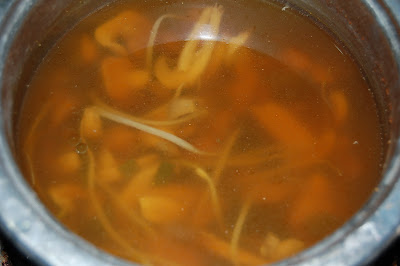Not so long ago my life was not comprised of a husband, children, family business or blog.
At one point I lived in a large house in the city that housed a collection of eco-do-gooders. Conscious communists of the French variety (born into commune life, not self-declared), bicycle messengers, and the other city-dweller sorts of earthy young adults who drove bio-diesel burners or never drove at all. We had the kind of transient roommates that are best described as couch surfers who seemed to drift effortlessly through life without a mailing address.
Everyone held stable-ish jobs for 20-somethings. One was even the head of a large corporation's programing department. His paycheck certainly wasn't the reason he lived in a communal house.
Some of these roommates and transients belonged to the local bike gang. Not quite Hell's Angels. The gang's activities included rehabbing bicycles to become load bearing and be sent to Developing Nations, creating environmental awareness through the city with their rides that closed down major thoroughfares, creating found-art of everything and anything and....

Dumpster Diving... for food. Also known as Dumpster Dining.

Our home often hosted large dinners of coworkers from an environmental watch group that could reach up to 20+ people on any given weeknight. Rent plus utilities and normal groceries rarely accommodate feeding that many others in your home regularly. I won't describe the incredible amount of food large grocery networks are forced by law or policy to throw away daily or the steps they take to ensure that their food isn't accessible once tossed to the dumpster, but you can imagine that every item that does not sell from your local Whole Foods will eventually end up in their dumpsters out back.

If that food is fortunate, and willing hands are fortunate enough to reach it in time the food may end up on someone's plate as a perfectly good meal. This photo of the found food is taken from an interview with a few
college-freegans in MN who seem to express the same sort of attitude as my former roommates.
I never ate a veggie gone bad, there was nothing on anyone's plate that had turned or soured. This was nourishment with intrinsic value both nutritionally and monetarily to our huge dinner tables. In fact, you'd be surprised at the way organic produce looks when finally given the heave ho from the aisles; wrapped, labeled, dated, edible. Most grocers even dispose of their expired items in a re-user friendly way quite naturally as each section takes care of their own clean-up, they bag and separate food items by department.
My life is long since removed from these re-purposed dinner tables. Here in Akko, there are not any alternative bike gangs running around screaming for the environment, or groups of youths jumping into dumpsters to rescue high quality organic produce that has sat for it's one day in the sun. There are no locks on our dumpsters to keep these alt-kids out.
But Akko is a terribly poor city. Our citizens are on average old and many live well under the poverty line even on government assistance. Many elderly collect bottles and cans from the receptacles for the tiny refund they can receive in the supermarkets. There are also quite a few salvagers who look for scrap out of the 40 year old electronics that are thrown to the curb. Although there are assistance organizations that take second-hand clothing for redistribution it is often most common for clothes to be left folded neatly in large bags and placed next to the dumpsters so someone in need might take these items quietly in the night without the shame of visiting an aid organization.
My home is directly behind the supermarket which, for comparisons, is roughly the size of a large American 7-11 with just 4 aisles. Our market opens at 7AM and by 8AM all of the cleaning of the produce aisle and the shipments for the new day have taken place. The old produce, often visibly rotten (high heat and high humidity are not the friends of such products) is brought out to the dumpster. By 8AM when I walk my daughter to preschool the entire back end of the market is covered with elderly waiting for this food to be disposed of so that they can toss it into their market carts to be taken home.

Today was the first day my 4 year old gave any serious notice to this matter. Although she is generally a very thoughtful and caring child she has learned from well intentioned adults that something unclean is labeled "foo dirty."
And so she began with her questioning, "Mama, isn't that a bad man? He is playing in the garbage. Foo. That's not nice."
My heart breaks a little every time I see someone's grandmother digging through our trash or someone's grandfather jumping in after the spoiled tomatoes but I had no idea how to explain in a Jewish and civilly responsible way to my child what she was witnessing.
Jewish law goes very far to explain that you are obligated to provide charity to others in need, even when you yourself are in need. Throughout Israel you will even notice that people do not throw out bread, it is left in the open for the poor to take. And overall, that while you are to provide for others in need, you must grant people their self respect which sometimes means allowing them to do what is necessary to survive. Slipping someone a few bucks to go into the market and buy food might seem like a reasonable action to the untrained bystander, but that very action might take away the person's dignity in accepting charity.
And so today I have to prepare myself for a talk with a four year old about the facts of life, that people in her city do go hungry and that people who look like her grandparents often wait for food to be thrown in a dumpster so they can feed their families. I know that this is true of other major cities, even in the lucrative suburbs of my youth, but here our poverty is apparent and should be confronted head on. Even if that means starting with my own children.
This is a short documentary called
Meet the Freegans
Britain has become serious about
reducing food waste in the home, great for conservation ideas

 (This is my husband's Gelt bag, twice the of the kid's bags, but often worn as a hat for photos)
(This is my husband's Gelt bag, twice the of the kid's bags, but often worn as a hat for photos)




































































